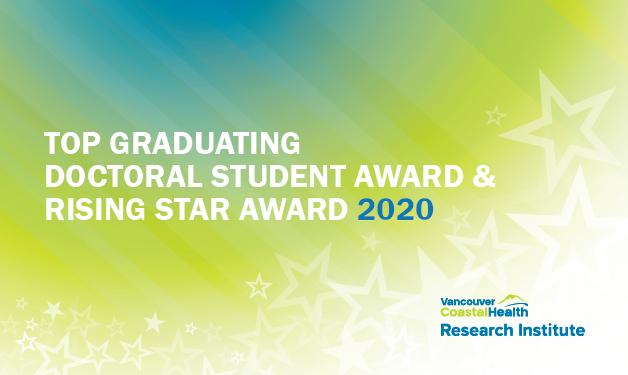
Congratulations to the 2020 Top Doctoral Student and Rising Star Award recipients!
Vancouver Coastal Health Research Institute (VCHRI) is proud to support tomorrow’s research leaders with the Top Graduating Doctoral Student Award and the Rising Star Award. These awards recognize outstanding efforts by VCHRI research trainees in research excellence, service as role models, and other contributions to the VCH research community.
The 2020 Top Graduating Doctoral Student award recipient is:
The 2020 Rising Star award recipients are:
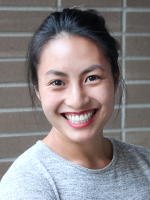
Award: Top Graduating Doctoral Student
Supervisor: Dr. Janice Eng
Area of research: Stroke rehabilitation
An exceptional student with a long list academic achievements, Shannon was the first applicant to enter the new combined PhD and Master of Physical Therapy degree program at the University of British Columbia (UBC). Her peers and supervisors within the Rehabilitation Research Program at the GF Strong Rehabilitation Centre highlight her critical thinking skills and her knack for problem-solving, noting that her clinical training as a physical therapist enhances her ability to take research discoveries from bench to bedside.
Shannon’s research focus is on stroke rehabilitation. Wanting to improve intervention therapies, her research project studies the use of functional near-infrared spectroscopy to measure stroke survivor’s brain activity and changes that occur while walking.
“Results from this study will characterize brain activations during simple and complex walking tasks as they relate to clinical walking outcomes and walking tasks within the community,” says Shannon. “These individual characterizations could lead to the creation of new, personalized walking therapies in the future.”
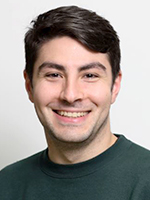
Award: Rising Star
Supervisor: Dr. Tania Lam
Area of research: Spinal cord injury
A trainee at the International Collaboration on Repair Discoveries (ICORD) research centre, Gevorg is known for his commitment and dedication to research. His supervisors speak highly of his ability to tackle complex projects and applaud his tireless work ensuring the entire research process runs efficiently from start to finish. His peers also recognize his leadership qualities and value to the ICORD research community.
Gevorg’s research explores the use of sensorimotor stimulation to enhance motor function in the pelvic floor muscles as a method for treating bladder dysfunction. Bladder dysfunction negatively impacts quality of life for many people with a neurological injury, including those with spinal cord injury (SCI) and multiple sclerosis (MS).
“Outcomes from this research could help refine current rehabilitation protocols and more effectively address treatments of urinary incontinence in individuals with SCI and MS, significantly increasing patients' quality of life,” says Gevorg.
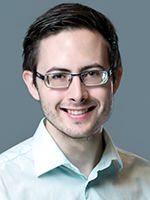
Award: Rising Star
Supervisor: Dr. David Huntsman
Area of research: Medical genetics and oncology
Known for his enthusiasm towards community engagement and volunteerism, Evan is admired by his supervisors for his pursuit of learning and research excellence, as well as the joy with which he approaches his work. Evan’s colleagues highlight that he is a fast learner who exceeds expectations and has a bright future in science and medicine.
Evan’s research interests are in medical genetics and cancer. In his current project, Evan is developing a novel system to study rare mutations in High Grade Serous Ovarian Cancer (HGSC), the most common and deadly type of ovarian cancer.
“Model systems like this one can help to uncover the effects of individual mutations in HGSC,” says Evan. “This knowledge will help researchers learn more about the formation of HGSC and could inform better medical interventions for patients in the future.”

Award: Rising Star
Supervisor: Dr. Janice Eng
Area of research: Stroke rehabilitation
With nearly a dozen published papers, Riley’s critical thinking and writing skills are highly commended by his supervisors at the GF Strong Rehabilitation Centre. His outstanding presentation skills are also well known in the research community. Riley was the first place winner of this year’s Three Minute Thesis competition, both the VCHRI heat and UBC's competition.
Riley’s research pursuits are focused on stroke rehabilitation and his project, the first trial of its kind in Canada, aims to determine if a robotic exoskeleton can help with gait rehabilitation for stroke patients.
“This study showed that the experience of using an exoskeleton for stroke rehabilitation purposes was a positive one for both patients and their physical therapists,” says Riley. “The incorporation of robotic exoskeletons in clinical practice could become more common in the future.”
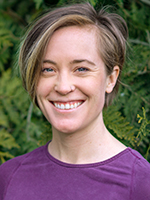
Award: Rising Star
Supervisor: Dr. Alex Scott
Area of research: Rehabilitation sciences
Hailed by her supervisors and peers as an inspiring scientist and team player, Jessie is known for her meaningful contributions in the fields of rehabilitation and pain research. Her research projects have resulted in several successful funding awards, including a two-year Research Training Award from WorkSafeBC. In addition to her skills as a researcher, she is also lauded as an extraordinary mentor to her fellow students.
Jessie’s current research is examining whether an aerobic exercise program can be used to control, or even reduce, chronic rotator cuff pain. Her hypothesis is that aerobic exercise could potentially help treat the sensitization seen in persistent rotator cuff pain.
“Results from this study could inform the development of new rehabilitation protocols and uncover potential mechanisms of pain control that can be used to refine exercise prescription for those experiencing rotator cuff pain and other chronic conditions,” says Jessie.
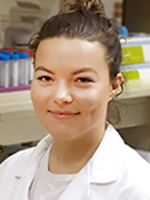
Award: Rising Star
Supervisor: Dr. David Granville
Area of research: Pathology
A star both on the soccer field and in the lab, Katlyn’s supervisors praise her as an exceedingly organized and well-rounded researcher with unique talents in athletics and academics, as well as first-rate communication and inter-personal skills. Her peers also note her contributions to the research community and workplace culture with her involvement in networking and social events.
Katlyn’s research investigates the enzyme granzyme K and the role it plays in skin health and disease, including skin aging. While the aging of skin is inevitable, this particular enzyme can significantly impact skin health and lead to impaired immune function and increased risk of injury.
“Currently treatment options for aging skin are limited and are not able to provide long-term symptom relief,” says Katlyn. “This study could provide the first evidence that granzyme K enzyme contributes to impaired skin function and is a therapeutic target for intrinsically aged skin.”
These awards will help fund the trainees’ travel to international conferences where they will share their findings with the research community. Conference participation is critical to the development of a research career, and we are proud to support them in this endeavour.


